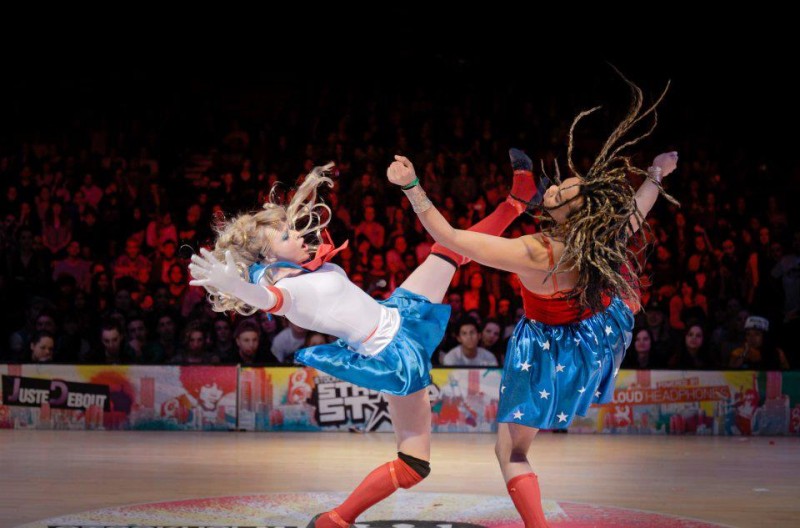3 vidéos sur le Voguing (inclus un battle entre Sailor Moon et Wonder Woman)

Until men like Trump stop debasing women, until they refrain from harassing, hurting, and… groping women, then we still need a Day of the Girl. To show our future generations that the battle of equality is far from being won.
This day is principally for the girls in dire situations – forced upon them by war, religion or poverty. But even in the West out girls are suffering and need more support than ever.
The Internet is their war zone. The selfie culture has opened a Pandora’s box of perfect bodies, hair, skin, teeth, spawning trends such as the thigh gap and A4 waist challenge. That’s the public aspect. On their closed social platforms, cyber bullying is rife. Being deleted as friend is a big deal for a 12-year-old. It is a deliberate and overt rejection. Then there is the increasing phenomenon of trolling – nasty, even hateful comments on a wall, tweeted in response. And then on private messenger there are a whole other gamut of pressures such as DTBN – or Dare To Be Naked in photos. And often one photo can lead to emotional blackmail to send more, otherwise the guy will publish them.
It is not therefore surprising that three quarters of girls around the world aren’t happy with their appearance and 5 out of 6 feel fat, leading to increasing numbers of anorexia, self-harm and depression. And that later on, that translates to a lack of confidence to choose the path they want – whether it is studying physics or becoming a pilot. Don’t forget there are more Johns in the FTSE 500 than there are women.
What to do?
Education has to change. The UK is now incorporating body confidence programs, to build resilience and address teen insecurities. But equality needs to permeate every aspect of school. There should be no more stories of math teachers asking pupils for their weight to work out the mean, or horrid experiences of being forced to wear a leotard in gym class when a girl doesn’t feel like it.
Brands and advertising are some of the biggest culprits. Stereotypes start very early and are deeply entrenched in everyday life – the pink and blue aisles in stores, encouraging fluffy sparkly toys for girls and fun action ones for boys. Or the woman in the cooking or cleaning ad, or the man driving the car or doing DIY. To sell a perfume it has to be a perfect sex bomb around the shoulders of a macho guy, heaven forbid that she is dashing on her way to a business meeting in a suit. Or changing after a rugby match.
Content too must join the movement. Films, books that are entertaining but boost a girl’s self-esteem, and ones where the girl saves the day for a change. We need more Katniss Everdeens. Judy Blume nailed it, with her protective and instructive stories. Today the chatter of vloggers set the agenda – permanents or gels? Brazilian or Hollywood?
And then us role models – mums, dads, aunts, uncles, godparents, babysitters. We all have a role to play. The language we use, from a young age, impacts on a girl’s view of herself. If we continually use terms such as ‘cute’ and ‘pretty’ for girls and ‘smart’ and ‘funny’ for girls, then we perpetuate the myth that girls should be judged by their appearance first. How many of us have looked at the mirror and grimaced, pinched an inch? Or how many have put them off from doing something ‘dangerous’, ‘muddy’ or ‘boisterous’?
We must encourage girls to go out and live adventurously. There is so much out there – Girl Guiding treks, football, martial arts. Karli Kloss is a great example of a role model of doing fashion differently. She doesn’t do Victoria’s Secret – instead she gets fashion companies run coding classes for teen girls. Or Millie Bob Brown from Stranger Things who is a very talented 12 year old, the lead in a top TV show, but she does her thing, whether it’s shaving her hair off or rapping.
The Presidential debate a few days ago is a reminder of the injustice that reigns. An ignorant male bully is somehow allowed to stand alongside a talented female politician.
If equality reigned Clinton would be the only candidate and Trump would have been reprimanded for his treatment of women.
Let’s hope we have more to celebrate next International Day of the Girl.
Elizabeth Kesses is the author of The Girl in the Corner, a trilogy of books about self-esteem.
Photo © UN Women – Shaista Chishty